The integration training course for persons under international protection has ended
Ievietots: 29.12.2022

Integration course for the third group of persons, who have received a refugee status or an alternative status, has been completed within the project Support Measures for Persons Under International Protection III. The group includes persons from Afghanistan, Iraq, Kuwait, Syria, and Belarus. The most interested in the course were people who have already started their independent life outside the CAS “Mucenieki”, but are still actively looking for a job and have a lot of different questions they want to find answers to during the integration course. This was an opportunity for people who had never met before to come together to share different life situations, support one another and find answers to questions they may have.
Together with lawyer Alvis Šķenders, participants visited the textile workshop “Daces meistardarbi”, where the owners of the workshop acquainted them with the specifics of textile business in Latvia and various technologies used in the manufacturing of products. Also, the participants themselves had a chance to try practically working on a loom and to weave ribbons together. The visit to this workshop was particularly appreciated by the participants from Syria and Afghanistan as they recognised that this sector is also very topical in their native countries. Many Afghan women have good rug making and embroidery skills.
To get acquainted with and understand the process of selecting a profession, qualification acquiring opportunities and the education system in Latvia, the participants together with lawyer Gita Miruškina visited the training centre “Buts” to find out about employment issues in practical environment. The participants were very interested in learning a new profession and admitted that the most important thing for them right now is to learn and strengthen their knowledge of Latvian language to be able to study at a training centre.
As a result of the discussions, the sessions highlighted specific needs of the participants for specific assistance to be solved together with the lawyers, such as family reunification issues, revision of potential draft apartment rent agreements, declaration of address of residence, use of the latvija.lv portal, obtaining and using e-signature, application for Riga resident’s card, revision of documents required for starting a business.
This was the last training group of the project. Since 1 September 2020, 28 groups have completed the integration training course, with 394 participants from 28 countries.

.jpeg)
.jpeg)
Support Actions for Persons Under International Protection III project is implemented withthe support of the Asylum, Migration and Integration Fund and is co-financed by the European Union. Grant agreement No. PMIF/9/2020/3/02
Events designed to explore the cultural canon are coming to an end
Ievietots: 27.12.2022

On December 12, the society "Shelter" Safe House"" invited international protection persons to the final event of the cultural canon, this time focusing on Riga and performing arts by visiting and having a closer look at the Latvian National Theatre, the Latvian state founding place.
International protection persons from Russia, Belarus, Afghanistan and Ukraine started the day with a tour to the Old Town, visiting the main central attractions. It was an exceptionally white day, it was snowing, so the participants of the tour were happy to get to the lee of the highest point of Bastejkalns, where the leader of the tour, Ramona Liepina, invited everyone to take out one of the Angel cards created by a Ukrainian artist and share their feelings and associations that the particular card symbolises in their life. Most of those present admitted that they see light and hope for the future.
.jpeg)
Later in the day, the participants went to a completely different district of Riga – the premises of the youth creative association "Trepes" on Viskalu street, where each of the participants had an opportunity to take part in various creative workshops of Latvian winter traditions – candle casting, soap making and holiday star creation. Everyone could choose the creative workshop of their interest – one or all 3. Almost all participants were involved in such activities for the first time. One of the participants admitted that for the first time in his life he had such an opportunity to enjoy the variety of essential oil scents, so he emphasised that it was a very special creative workshop, letting to forget all everyday problems, being here and now.
Most of those present arrived in Latvia quite recently. In order to get an insight into life in Latvia, employment opportunities, volunteer work, people, domestic activities and to hear what would be worth considering from a person who has been living in Latvia for a long time, Palina Burko from Belarus, who received refugee status in Latvia and has been involved in several volunteer organizations, including the society "Shelter "Safe House"" was invited to a joint conversation. Palina shared her integration story to inspire others. Palina received a number of questions from those present, and the discussion developed both about politics and the opportunities provided by Latvia, as well as Latvian guys.
After a recuperating coffee break with buns and warm drinks, all participants were taken to the Latvian National Theatre by bus. The building which has been passed by quite often this time is a special stopping point. At the theatre, the group is welcomed by actor Ivars Klavinsky, who is the group`s accompanying person tonight to enter even the most secret theatre chambers. All participants were surprised to learn that this building was an architectural and artistic monument of national importance. Also, the fact that the Latvian state was founded in this place caused very special feelings among the participants of the tour. All those present were behind the scenes of the theatre for the first time – on the basement floor, in workshops where props for performances are made, in tailoring workshops, etc. Everyone had the opportunity to walk around the theatre premises, halls, foyer. Exploring the 1st floor foyer, some of the participants recognised the actor portraits on the walls because they had seen these actors in various Russian films. The participants admitted that they would like to attend a performance of this theatre.

This was the final event designed to explore the cultural canon. As a part of the project, 7 events of cultural canons have taken place – Riga architecture and design photo rally, exploring the traditions of Latvian folklore – folk songs, exploring folk traditions – traditions of baking bread in the Latgalian style, exploring the history of cinema and transforming into movie characters in the Preili doll museum, exploring the canon of visual art by visiting the Latvian National Museum of Art and the Vakarbulli Sculpture Park, the music canon by visiting the music city of Liepaja and performing arts by visiting the Latvian National Theatre.
Since September 1, 2020, 227 participants have been involved in cultural canon activities.
Support Actions for Persons Under International Protection III project is implemented withthe support of the Asylum, Migration and Integration Fund and is co-financed by the European Union. Grant agreement No. PMIF/9/2020/3/02
The course of Latvian for persons under international protection has ended
Ievietots: 22.12.2022

To promote the inclusion of persons under international protection in society, since 1 September 2020 Society “Shelter “Safe House”” has been implementing the project “Support Activities for Persons Under International Protection III”. The course of Latvian language was one of project activities.
Within 27 months the Latvian training course was mastered by 17 groups, which included 218 representatives of the target group from 22 countries: Afghanistan, Azerbaijan, Belarus, Bangladesh, Eritrea, India, Iraq, Iran, Cameroon, Congo, Russia, Kuwait, China, Morocco, Pakistan, Palestine, Syria, Sri Lanka, Tajikistan, Turkey, Ukraine, Uzbekistan. 180 persons received certificates of successful attendance and completion of the training course.

The training was organised both on site and remotely. On-site training was held at CAS Mucenieki, and one group was organised at the premises of Ikšķile Secondary School. Representatives of the target group from Ikšķile, Ogre and Riga participated in the training. 8 groups were organised remotely on Jitsimeet and Zoom platforms, where the training was received by persons from Mucenieki, Rīga, Saulkrasti, Liepāja, Ventspils, Tukums, Jūrmala and Ogre. 6 of the groups were organised remotely due to the Covid-19 pandemic and restrictions on face-to-face meetings, while 2 groups were deliberately organised on Zoom platform in order to provide an opportunity for persons under international protection from various regions of Latvia to learn Latvian using Russian as an intermediate language.

The great interest of persons under international protection in learning the Latvian language increased over the last year, especially in the summer months, when 3 Latvian language teachers taught 5 training groups at the same time. The demand still stands, and several representatives of the target group are waiting for the continuation of Latvian language courses in 2023. Some students have a very strong desire and motivation to continue their training at level A2, but it often takes longer for the next courses to start. There are also positive examples where within 5 months spent at CAS “Mucenieki” a person is able to take both level A1 courses offered by the society and immediately begin level A2 courses in projects offered by other organisations and successfully pass level A examination in order to successfully engage in working life with basic knowledge of Latvian, being able to communicate independently.

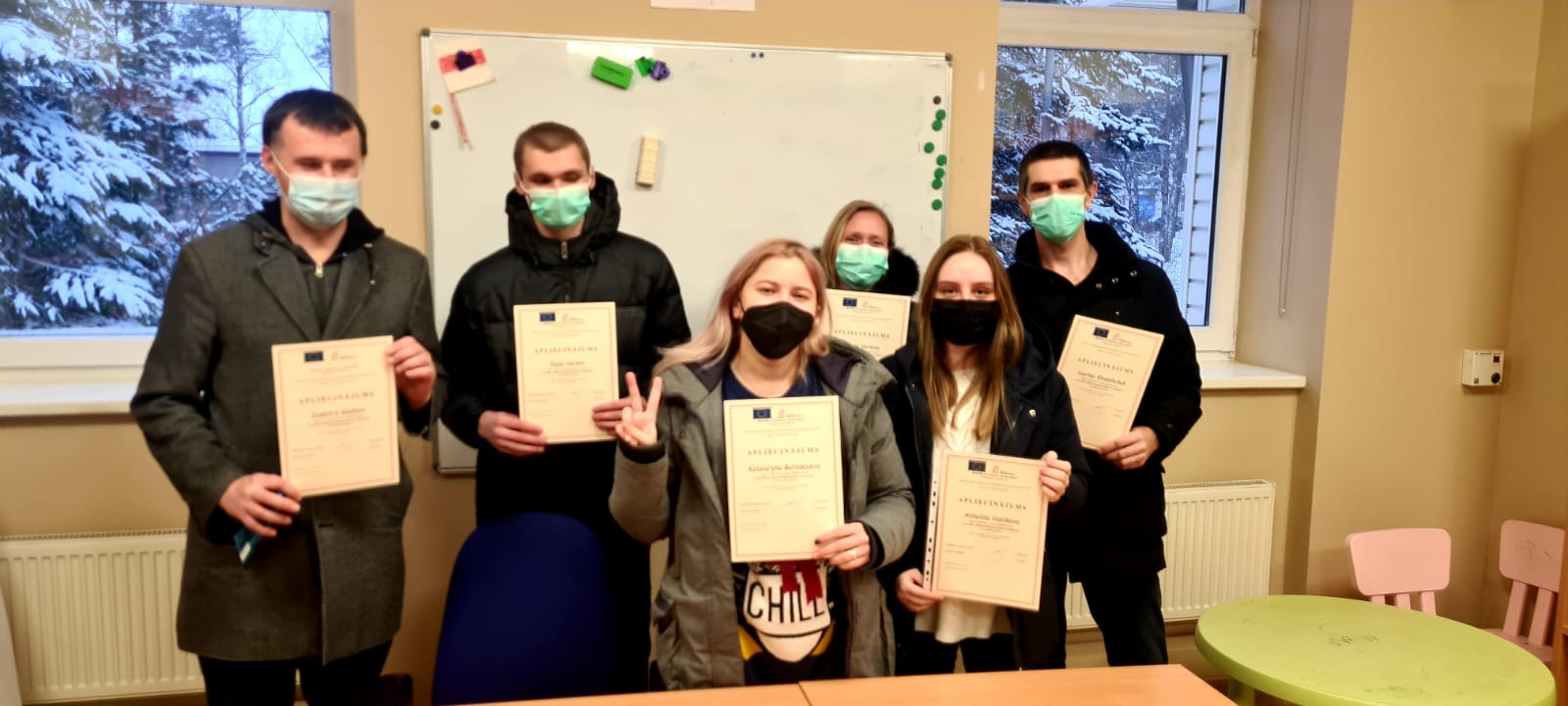
Within the scope of the course of Latvian language persons under international protection had an opportunity to get language knowledge and skills necessary for work and everyday life, as well as develop main language skills: reading, speaking, writing, listening and use of grammar. Course participants had an opportunity to learn the language to communicate in solving different matters at a simple level or prepare documents in local government or state institutions, thus increasing the number of social contacts of the target group, increasing participation in the life of society in general. During the training, a great deal of interest arose to life in Latvia, its history, culture and holidays. Latvian traditions and holidays were also learned during the training. If anyone had a birthday on their training day, then they were congratulated with a cake. Special holidays were celebrated together and information was provided on the various activities and events that members of the group could attend. The students actively participated in the situational language games organised in the classroom, diligently did homework, worked individually and in pairs.
Together with the Latvian language teacher, study groups visited the Krišjānis Barons Museum, Latvian National Museum of Art and Art Museum Zuzeum. The groups went to the Old Rīga, Central market and Vērmanes Park, where they could use their knowledge of Latvian in practice.
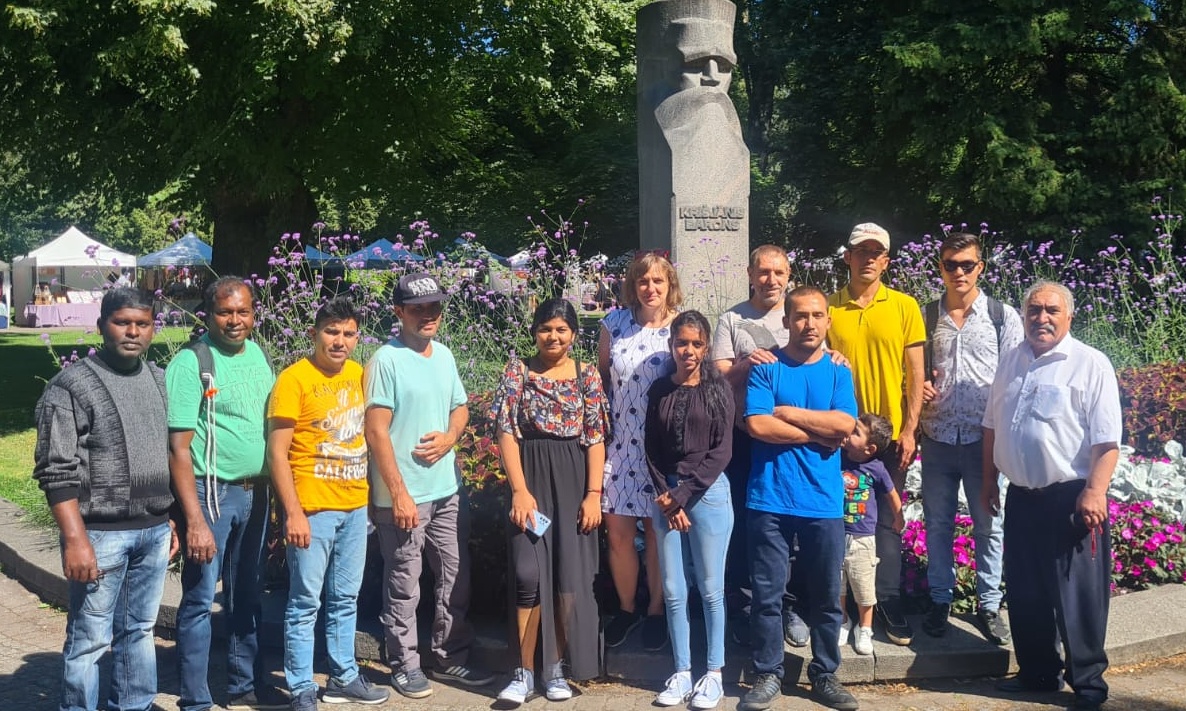
Graduates of the last group, as well as participants of previous groups were invited to the final meeting, where certificates of the course were issued and they visited the art museum “ZUZEUM” together. Zuzeum welcomes every person under international protection to visit the museum free of charge.

Support Actions for Persons Under International Protection III project is implemented withthe support of the Asylum, Migration and Integration Fund and is co-financed by the European Union. Grant agreement No. PMIF/9/2020/3/02
Integration through celebrating November 11th holiday!
Ievietots: 17.11.2022

On November 11, the 26th integration training group of the project “Support Activities for Persons Under International Protection III” completed by participating in final lectures, including those devoted to Latvian traditions and public holidays, led by the lecturer and the organiser of intercultural communication activities Ramona Liepiņa. Persons under international protection from Russia, Belarus, Syria and Azerbaijan engaged in the lesson with great interest and passion, they asked questions because they saw a lot of similarities between traditions of our countries, so they shared how the festival was celebrated in their cultures. R.Liepiņa admits that culture and traditions could be discussed all day long, because there are so many important aspects that are important to tell, show and compare with the cultures from which they come.
It is always very interesting for everyone to know that name days are celebrated in Latvia, then this time we found a day in the calendar, when they can celebrate their name day, for almost every member of the course, for example, Maria, Christian, Boris, Vladislav, Victoria, Maxime, Irina, Elena, etc.

After the lesson, everyone was invited to participate in the November 11th event of the Information Centre for Newcomers to jointly learn the nature of the day and create a Latvian map from lighted candles in the courtyard. Then all the members of the group together with the lecturer R.Liepina went to put flowers together at the Freedom Monument and to light candles on the quay, thinking both about Latvia and about peace for everyone in their country.
As the members of the group from Syria acknowledged, they would always remember this day because they themselves would not have come to the quay, so they were delighted that on this day there was an integration course and, together with the group and the translator, they had this opportunity to experience and feel the Latvian community and patriotism.


Support Actions for Persons Under International Protection III project is implemented with the support of the Asylum, Migration and Integration Fund and is co-financed by the European Union. Grant agreement No. PMIF/9/2020/3/02
Autumn equinox – Miķeļdiena!
Ievietots: 29.09.2022

Today, Miķeļdiena, which marks the autumn equinox, was celebrated. To celebrate and experience this festivity together, persons under international protection met at the Society “Shelter “Safe House””.
Organiser of intercultural communication activities Ramona Liepiņa introduced the participants to the traditions of Miķeļdiena in Latvian culture. R. Liepiņa told about various beliefs that should be observed and remembered on this day.
Everyone was involved in creative activities. Someone cut sweet peppers, pumpkin, onions and carrots to make pumpkin soup, someone else got creative and carved a pumpkin specially brought for the evening from Ugāle gardens. Another participant prepared blue cheese cubes and bread croutons to add to the soup. While the soup was being made, everyone had the opportunity to get creative by creating paintings with autumn leaves and colours.
As usual, when welcoming guests, Latvians invited everyone to a common table to enjoy warm pumpkin soup, discuss the common things and differences in how pumpkin is cooked in each country, and taste the Latvian symbol – true rye bread, which some of the attendees tasted for the first time and found very tasty. We learned that in Afghanistan, too, no food is eaten without bread, and a person will not be full if the meal does not include bread.
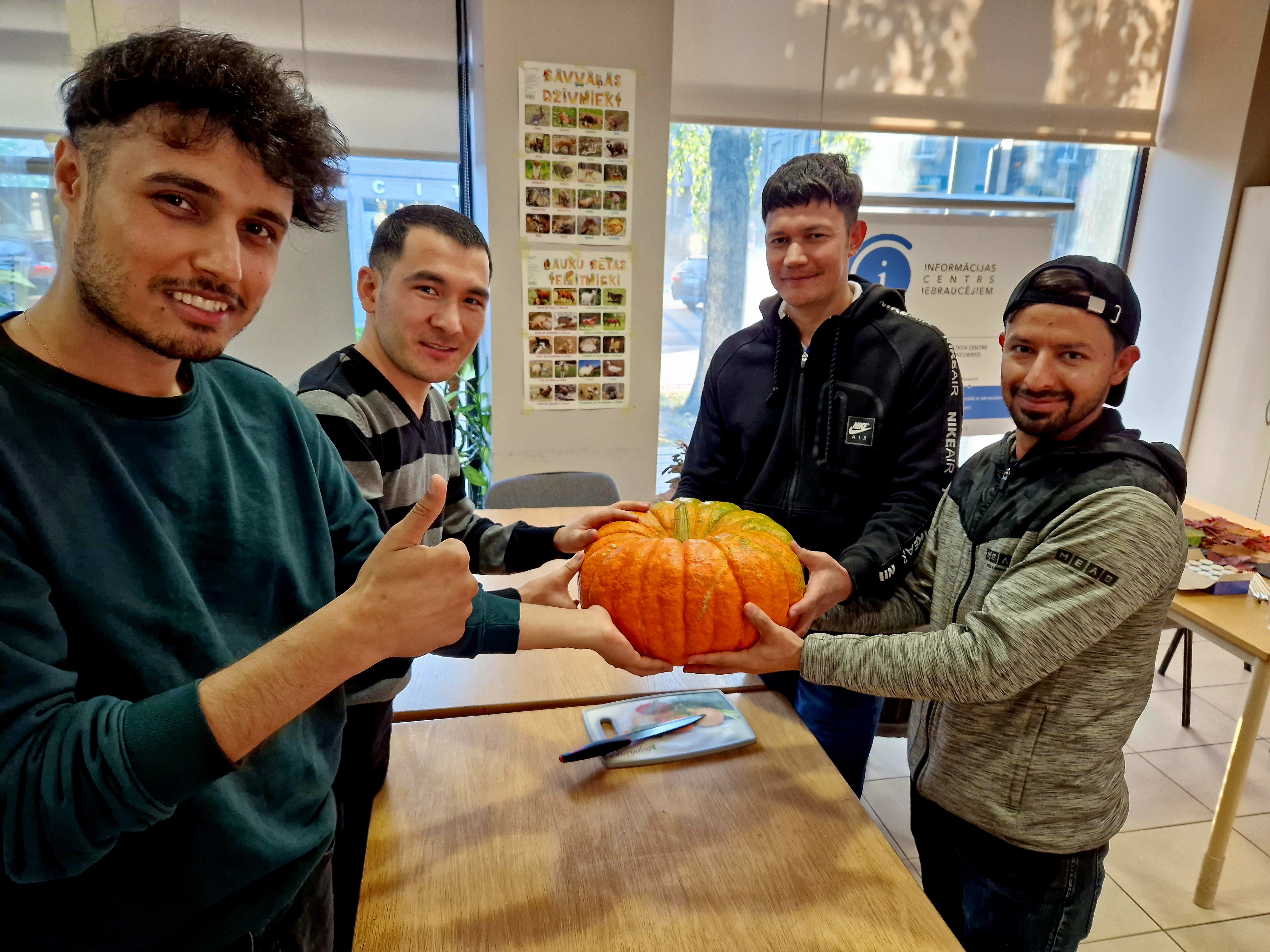

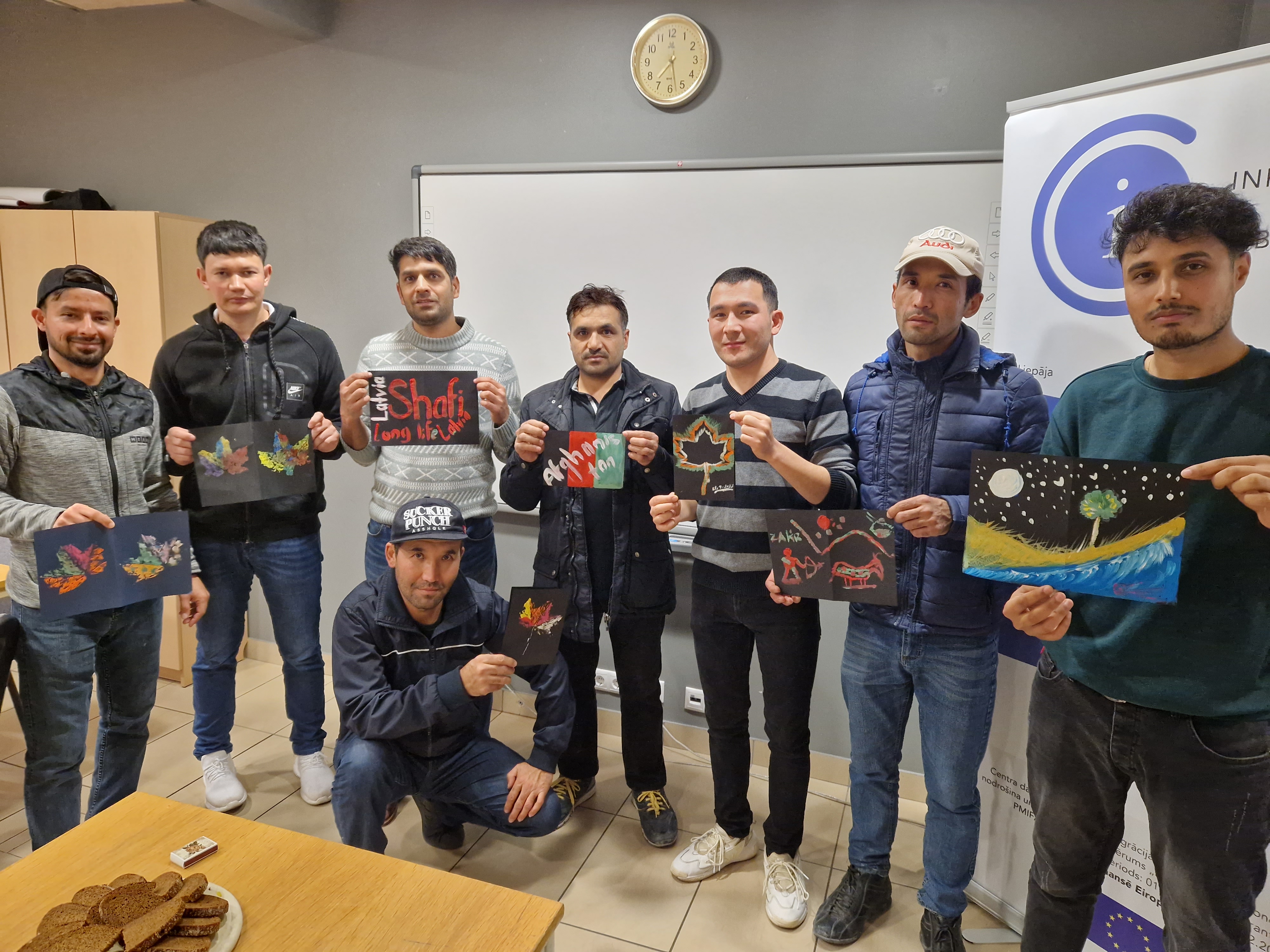


Support Actions for Persons Under International Protection III project is implemented with the support of the Asylum, Migration and Integration Fund and is co-financed by the European Union. Grant agreement No. PMIF/9/2020/3/02
Experience culture and traditions!
Ievietots: 20.09.2022

oday, the 25th training group started classes of an integration course within the project “Support Activities for Persons Under International Protection III”. During the first meeting the class on Latvian traditions and national holidays was led by the lecturer of Society “Shelter “Safe House”” and the organiser of intercultural communication activities Ramona Liepiņa. Among the topics like Latvian state, history, principles of non-discrimination, apartment market, employment opportunities, education system, healthcare system, social security network and social support system in Latvia, another very important topic of the integration course is culture and traditions.
People coming to a foreign country and seeing foreign culture are observing with interest what is going on around them. The first thing they notice are local people and their daily life. Therefore, R.Liepiņa tells with pleasure not only about Latvian holiday traditions and their celebration, but also about small festive occasions like celebrations of name days, which is something new for newcomers and everyone wants to know, when his or her name day is or would be celebrated in Latvia. Many participants of the lectures wish to know more about national holidays and observable days. This lets them understand why a specific date in Latvia is a holiday and what the local community observes or celebrates. I tell about celebration of traditions in the old Latvian style and traditions adapted to contemporary life or specific religion. The lecture is also devoted to observable days in Latvia, holidays deeply rooted in society and even commemoration at cemetery holidays and candle evenings, which are characteristic to our culture.
R.Liepiņa admits that during her classes she always sticks to the events that can be observed in daily life and in society. For example, a newcomer may hear Latvian music with “Ligo, ligo!” in June in supermarkets in Riga and even hum the catchy sound without knowing its meaning. Such lectures help newcomers to have a grasp of what is happening and to remember what they have heard or discussed, because then music sounds with “Ligo” will mean something, remind of the approaching summer solstice and celebration of the Latvian holiday. Then hundreds of candles in the evening on the Lacplesis Day will not be a surprise, but the person will be able to become part of the commemoration event or any other holiday celebration.
R.Liepiņa: “I create every lecture like a sun path all year round, because such a sun circle is characteristic to all cultures of the world. People spend their lives in cycles between seasons and also between traditional events. This helps to better understand the different, this makes it easier to make a comparison to own culture, this makes it easier to integrate and to find where you belong. Every person sees himself or herself through the family of his or her mother and father, own upbringing model, own cultural traditions, and own personal values. Therefore, we treat every newcomer with respect and during lectures ask to make a comparison with their culture or traditions. This also enables a discussion and encourages to ask each other questions.”
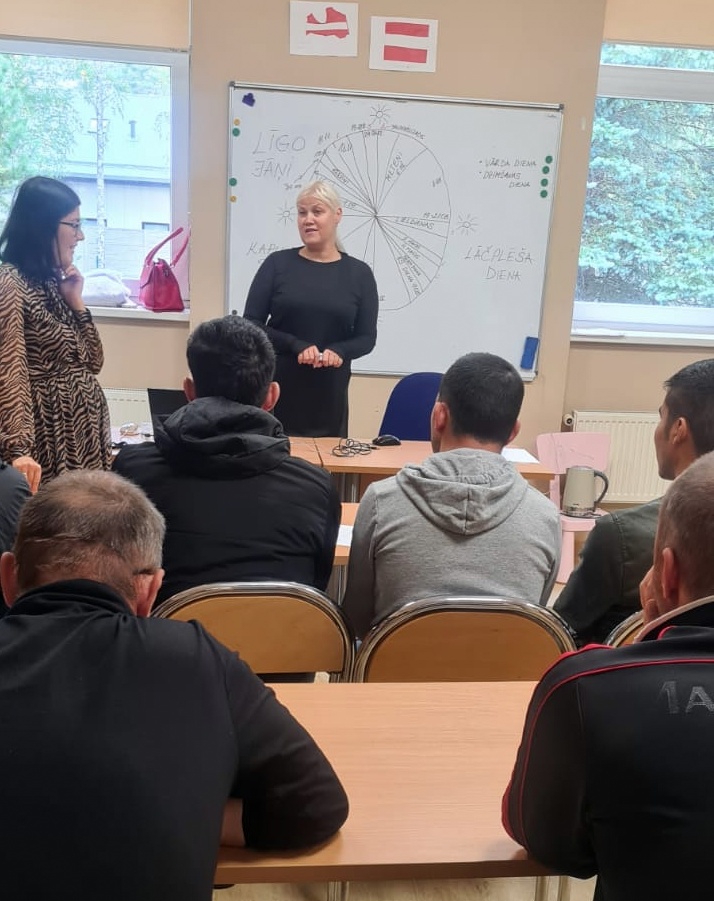
Support Actions for Persons Under International Protection III project is implemented with the support of the Asylum, Migration and Integration Fund and is co-financed by the European Union. Grant agreement No. PMIF/9/2020/3/02
While visiting Liepāja, refugees get to know Latvian cultural canon Music
Ievietots: 29.07.2022

In the early morning of 26 July, persons under international protection from Belarus, Afghanistan, Syria, Iraq, Eritrea, Russia, Tajikistan and Sri Lanka went on a joint exploratory excursion to Liepāja –the city of music – to discover the cultural canon Music.
Having arrived in Liepāja, we were welcomed at the centre Namīns of the folklore group Atštaukas, where the folklore group told the participants about Latvian annual holidays, teaching various games, dances and songs. Asylum seekers from Afghanistan admitted that this was their first experience getting to know Latvian cultural traditions and in their opinion many elements of our countries are similar. The participants were surprised that the folklore group tries to attract the younger generation so that Latvian holiday traditions are continued.
The main family value is the heir, which is equally important in all cultures. The folklore group invited representatives of each culture through a game to sing their country’s lullaby. At the end of the activity, everyone joined in a song and dance. The members of Atštaukas were very surprised how well some of those present already spoke Latvian, even more surprised to learn that some of them have only resided in Latvia for 20 days, but were able to communicate and respond in Latvian.
After sitting for a long time during the trip from Riga, then dancing and singing together with the folklore group, a little tired, but still ready to explore Liepāja, the participants had the opportunity to visit the concert hall Lielais Dzintars.
After a long walk through the musical and beautiful Liepāja, a journalist from Belarus Vika Trenas shared her experience of life in Tukums with a Latvian family. Vika admits that it is most efficient to integrate and learn the language in small towns and not in big cities, where intermediate languages are used. Vika is very grateful for being welcomed in a Latvian family, where she learns and speaks Latvian. You can get to know traditions best by preparing for and celebrating holidays together. Vika devotes a lot of energy to educating the residents of her country about the political situation there, because the citizens feel that the political situation internally corresponds to their conceptions. Vika also received several questions from other participants about her professional field, as well as about what surprised and thrilled her most about living in a Latvian family.
At the end of the event, the participants admitted that they were very inspired, seeing that life goes on not only in Riga, but also in other cities and towns, and there are also opportunities to live, work, study and be socially active. The participants are grateful for the opportunity to spend the day outside ASC Mucenieki. For some, it is the first time outside of Riga, some have already managed to visit and get to know Liepāja. Some are meeting each other for the first time in person, because they have been learning Latvian together for the last 3 months through the Zoom platform, where they only saw each other on a small video camera. Someone else admits that they are seeing the sea for the first time in their life and that these will be the best memories from Liepāja. Someone else found the architecture of Liepāja very surprising, that students study in a gymnasium – a building which is very luxurious, just like palaces in their country.

Support Actions for Persons Under International Protection III project is implemented with the support of the Asylum, Migration and Integration Fund and is co-financed by the European Union. Grant agreement No. PMIF/9/2020/3/02
In May, 2 Integration Courses Were Completed and 4 Latvian Language Courses Were Held
Ievietots: 01.06.2022

Society “Shelter “Safe House”” informs that the integration training course about Latvia organised within the project Support Measures for Persons Under International Protection III has been completed by two training groups, which started their training in the beginning of May. In six meetings, asylum seekers from Afghanistan, Syria, Belarus, Russia, and Uzbekistan gained comprehensive knowledge about Latvia.
Dari and Arabic interpreters were involved to ensure quality communication with the course participants. Russian was used as an intermediary training language.
Project manager Zanda Rudene acknowledges that this course is very important for the education of asylum seekers. It is an opportunity to discuss important integration issues. It should be mentioned that the integration starts with information on the use of the train and Riga’s public transport, and the use of Google Maps to get to a given address. We also have to encourage women and young people from the families to join the classes, as well as provide a small insight into the variety of Latvian snacks while enjoying coffee breaks. For example, groups were offered the opportunity to taste cottage cheese snacks, honey cake, various candy, cream puffs, kvass, meringue cookies to find out the preferences of the course participants. Z. Rudene tells that currently more and more persons are staying in their places of residence outside the CAS “Mucenieki”. Therefore, it was particularly important to coordinate these groups as they were attended by people currently living in Ikšķile, Ulbroka, Riga city centre, Sarkandaugava, CAS “Mucenieki”, as well as a person who joined remotely as they currently live in Liepāja.
As part of the integration training course, participants had the opportunity to gain knowledge about Latvia, its state system, history, culture and traditions, practical information about Latvia, integration into the society, non-discrimination principles, housing market, employment opportunities, education system, healthcare system, social security network, and social support system in Latvia.
There are also currently four Latvian language study groups, which are being held according to the target group’s ability to attend the course. Two groups are held on the premises of the CAS “Mucenieki” for asylum seekers with or without different intermediary languages. One group is implemented remotely using Russian language on Zoom platform, as this group consists of persons under international protection from different places in Latvia – Saulkrasti, Liepāja, as well as from Riga – Mucenieki, Ķengarags, Sarkandaugava and central districts. One group is organised on the premises of Ikšķile Secondary School, where the target group comes from Ikšķile, Ogre, and Riga. There is a great interest and desire to learn Latvian, with 54 people from Afghanistan, Belarus, Azerbaijan, Syria, Uzbekistan, Kuwait, Russia, and Ukraine currently taking part in the training.
The aim of the Latvian language training course is to enable persons under international protection to acquire the knowledge and skills of the Latvian language necessary in the work and everyday life environment, as well as to develop main language skills.
Support Actions for Persons Under International Protection III project is implemented with the support of the Asylum, Migration and Integration Fund and is co-financed by the European Union. Grant agreement No. PMIF/9/2020/3/02
Persons Under International Protection Celebrate the 4th of May
Ievietots: 06.05.2022

Persons under international protection gathered to celebrate the 4th of May, which marks the Day of the Restoration of Independence of the Republic of Latvia Persons who have recently arrived in Latvia joined the celebration of the White Tablecloth Celebration in the society “Shelter “Safe House”” with great interest.
The event was attended by persons under international protection from Afghanistan, Belarus, Iraq, Kuwait, Russia, Congo, and Syria, as well as volunteers who helped to create a festive atmosphere by decorating the premises and providing delicious snacks. Each participant received a flag pin to wear on the day of celebration and in the future. As the event began, a representative from each country was invited to light a candle for Latvia and for all of us, for freedom, hope, and growth.
Together they learnt about the tradition of the White Tablecloth Celebration, sang Latvian folk songs accompanied by volunteer Marta Zeltiņa playing guitar, as well as tested their agility in Latvian folk dance, singing together the Latvian folk song “Bēdu manu lielu bēdu” (“Worry, My Big Worry”). Latvian traditional dishes for special occasions were introduced and two creative workshops were held – painting stones and creating a large element of the Lielvārde Belt piece by piece.
As one of the participants of the event admitted, it is necessary to experience the festivities and Latvian traditions, it is not enough to read about them on the Internet. Everyone had the opportunity to say their good wishes to Latvia, to feel a sense of belonging and unity in the country where they are starting a new chapter in their life.

Support Actions for Persons Under International Protection III project is implemented with the support of the Asylum, Migration and Integration Fund and is co-financed by the European Union. Grant agreement No. PMIF/9/2020/3/02
Celebrating Easter together!
Ievietots: 25.04.2022
On April 13, persons under international protection celebrated Easter in a cordial atmosphere learning about Latvian traditions of its celebration.
Asylum seekers from Belarus, Afghanistan, Ukraine and Russia gathered at the Society “Shelter “Safe House””, coloured eggs using different techniques, enjoyed different Latvian delicacies and listened to Latvian power songs, as well as shared information, how they celebrated Easter in Russia, Belarus and Ukraine. For guys from Afghanistan, this was the first experience of Latvian Easter traditions.
The participants of the event went home with a lot of inspiration, coloured and batik painted eggs, full stomachs, many positive emotions and cordiality gained from each other.

Support Actions for Persons Under International Protection III project is implemented with the support of the Asylum, Migration and Integration Fund and is co-financed by the European Union. Grant agreement No. PMIF/9/2020/3/02
Refugees and persons with an alternative status acquire an integration course
Ievietots: 31.03.2022

An integration course for the second group of persons, who have already received a refugee status or an alternative status, has been completed within the project “Support Measures for Persons Under International Protection III”. The group includes persons from Afghanistan, Russia and Belarus.
The main objective of this integration course is to provide representatives of the target group with useful ad practical knowledge for living in Latvia, at the same time giving answers to questions of the target group, arisen while residing in Latvia.
The course was planned, adapting it to the group`s desires and needs. Already during the first class the most essential problem issues of the group participants were discussed and emphasised, looking once more at the most essential issues currently faced by the group participants.
The following topics were covered during the course:
- Housing
- Residence permits, possibilities of legal residence in the EU
- Social security network in Latvia
- Social assistance system in Latvia
- General introduction about Latvia, history of Latvia
- Education
- Employment, starting a business
- Healthcare system
- Non-discrimination and equal opportunities
- Healthcare system
- Spending of free time
Within the framework of the course, also several practical activities were organised, visiting various companies, in order to gain understanding of various employment and education issues.
Together with the lawyer Gita Miruškina, participants visited the company SIA “Livonia Print”, where its management kindly acquainted them with the factory and the participants had a chance to ask any questions of interest about this company and working conditions. The management of SIA “Livonia Print” admitted that employees are badly needed and that they are ready to ensure training to all interested persons. Some of the participants indicated that, in order to work at this company, they would need to find a place of residence closer to the company, otherwise they will have to use two types of public transport, which would take 1.5h.
Together with the lawyer Alvis Šķenders, the group participants visited the textile workshop “Daces meistardarbi”, where the owners of the workshop acquainted them with the specifics of textile business in Latvia and various technologies used in the manufacturing of products. Also, the participants themselves had a chance to try practically working on a loom and to weave garters together. The visit to this workshop was particularly appreciated by the participants from Afghanistan; they admitted that this is the area that is very topical also in Afghanistan, and many Afghan women possess knowledge and skills of making rugs and doing embroidery works.
In order to get acquainted with and understand the choice of professions, qualification acquiring opportunities and the education system in Latvia, the group participants together with the lawyer Gita Miruškina visited the training centre “Buts”, to find out about education and employment issues in practical environment. The participants were very interested in learning a new profession and admitted that the most important thing for them right now is to learn and strengthen their knowledge of Latvian language to be able to study at any of these training centres. One of the participants agreed with the training firm that starting from April he will commence studies, as he has already received the refugee`s status.
As a result of discussions, specific needs of participants for specific assistance were identified, which can be resolved in cooperation with lawyers, for example, revision of potential draft apartment rent agreements, declaration of address of residence, use of the portal latvija.lv, receiving and using of e-signature, application for and receiving of Riga resident`s card, revision of documents required for starting a business.
The course was concluded with a lecture read by the lecturer Ramona Liepiņa on the Spring Solstice traditions, voluntary work in various organizations, involvement of youth in EU programmes, and collective working in a soap masterclass, where everyone had a chance to make own aromatic soap.
Support Actions for Persons Under International Protection III project is implemented with the support of the Asylum, Migration and Integration Fund and is co-financed by the European Union. Grant agreement No. PMIF/9/2020/3/02
Persons Under International Protection Get To Know the Latvian Cultural Canon “Art”
Ievietots: 29.03.2022

Throughout the day on 26 March, within the project “Support Measures for Persons under International Protection III”, participants from Afghanistan, Belarus, Ukraine, Iran, Turkey, Latvia, Columbia and Russia learned about the Latvian Cultural Cannon “Visual Art”!
The chilly Saturday morning started with the persons under international protection making their way to the Latvian National Museum of Art together. Some of the participants came by foot, some of them arrived as far as from Purvciems, Mucenieki, Ķengarags and even Ikšķile, but they were united by one goal – an opportunity to meet and to gain new impressions and inspiration.
An inquiring excursion through the museum was followed by the next stop point, while exploring new scenery of Riga along the way: Ķīpsala, Daugava from a different viewpoint, Dzegužkalns park, Spilve Airport. When the bus had already reached Bolderāja, a question was asked: “Are we still in Riga?” We drove past the Daugavgrīvas fortress. Then the Pauls Jaunzems stone sculpture park appeared before eyes of the participants. Fairly significantly, the artist himself has described one of the sculptures “Meditation about roots” – “...I think a lot about the thousands of people who have been uprooted from their homeland and try to set roots elsewhere in the world,” very precisely also portraying the feelings of our participants today, as they start their life in Latvia.
Upon our return to Riga, we visited the creative association for youth “Trepes” where its manager Ramona Liepiņa introduced everyone present with this building’s history and opportunities of voluntary work at various organisations. Also people who currently have the status of an asylum seeker were encouraged to get involved. Involvement would facilitate learning about the local community, help socialise, engage in projects and gain new knowledge.
The attendees listened with deep interest to a young refugee man and a refugee family from Turkey telling inspiring stories of their experience, how they arrived at Latvia, started a new life here, started a business and sharing experience-based suggestions to those who have just recently reached Latvia.
A high number of gathered participants from Afghanistan were taken by surprise. The special traditional Afghan dish kabuli pulao was ordered at “Hot kebabs” – one of the few places in Latvia offering halal food. It is especially important that people from Afghanistan who received refugee status several years ago are employed here.
The closing activity of this day was spent in the premises of the Artists’ Union of Latvia where participants had the opportunity to take part in a creative workshop, creating doves together with the artist Sandra Sabīne Jaundāldere, and to leisurely enjoy the bright artistic work exhibition.
In the end of the event, the participants acknowledged the importance of togetherness, inclusion and being an equal person. For some this was the first time visiting a museum, for some others – the first time going sight-seeing in Riga. Everyone went home filled with inspiration!

Support Actions for Persons Under International Protection III project is implemented with the support of the Asylum, Migration and Integration Fund and is co-financed by the European Union. Grant agreement No. PMIF/9/2020/3/02
An integration course for persons under international protection has started
Ievietots: 24.02.2022

A second group of persons, who have already received a refugee status or an alternative status, has started classes of an integration course within the project “Support Measures for Persons Under International Protection III”. The group includes persons from Afghanistan and Belarus, who are accommodated in CAS “Mucenieki” and who live in Riga.
During the first meeting, the class on residence permits and housing was led by Alvis Šķenders, a lawyer of Society “Shelter “Safe House””. The vital matters for the target group were clarified during this class, thus guiding the lecture into practical matters from the very beginning and the possibility to help with practical information on starting life in Latvia. The most topical matters for the target group were housing, employment, education opportunities for children, state benefits. Taking into account that representatives of this group have obtained the status of international protection quite recently, then, as the participants themselves have recognised, the meeting was valuable.
The course was planned for the persons to better delve into and understand topics like business, social assistance system, healthcare system, education, employment, residence permits, housing, Latvia and its history, etc.
It should be noted that several practical activities are planned within this group, that is, to attend companies SIA “Livonia Print”, textile workshop “Daces meistardarbi”, training centre “Buts” to get acquainted with education and employment matters in a practical environment.
.jpg)
Support Actions for Persons Under International Protection III project is implemented with the support of the Asylum, Migration and Integration Fund and is co-financed by the European Union. Grant agreement No. PMIF/9/2020/3/02
Face-to-face lessons are with more added value and benefits
Ievietots: 21.01.2022

Society “Shelter “Safe House”” informs that training group 7 completed the training course of Latvian at the end of December. In this group, Latvian was learned by 13 persons under international protection from Iran and Afghanistan and 12 certificates were issued at the end of the course. The lessons started online, but as soon as it was possible the group continued face-to-face training in the premises in CAS “Mucenieki”.
According to the students themselves, face-to-face lessons are more valuable, but remote training is easier because family specifics are such that you can be with your children, especially for moms who breastfeed children. But the biggest disadvantage of remote learning is that you cannot learn all the four skills, especially writing. Therefore, it was a great advantage to study face-to-face in December, face-to-face lessons were attended willingly by the family members who found it difficult to learn remotely. It was also valuable that through our mother tongue interpreter we could clarify vague grammar items.
The course of Latvian is currently continued by 3 groups: customers from Belarus, Azerbaijan, Turkey, Afghanistan, Iraq, Congo and Uzbekistan. Two groups learn face-to-face at CAS “Mucenieki”, while one group learns remotely on the Zoom online platform, where the group includes asylum seekers from Belarus, who live in Jurmala, Ogre, as well as CAS “Mucenieki”. The teacher, L. Zilberte, acknowledges that the online platform is ideal for training for students living in different towns and who have good skills in working with the latest technologies and where one language can be used as intermediate language in communication. “These group lessons are only part of the process, but students already show an initiative after the end of this course to continue training in other courses, so together we have completed applications for learning Latvian so that students of this group can continue their training in courses of the Latvian Language Agency in February”.
Due to the uncertain situation due to the spread of Covid-19, there is a possibility that face-to-face lessons would have to be switched to remote learning. We are already flexible and, if one of the students is ill or in quarantine, it is possible to follow the training process online or to receive a recording of the lesson in Zoom. Remote training during quarantine is hampered by the fact that there are several persons (families with 6 children) in one room who have no technical means available to continue the training process qualitatively.
Although the programme is designed for the target group to reach level pre-A1, it should be acknowledged that highly motivated groups can reach level A1 and continue to learn the language already at level A1/A2. This is demonstrated by the representatives of the target group, who completed Latvian language learning group 3 in March 2021 had have recently passed the Latvian language examination receiving level A2.
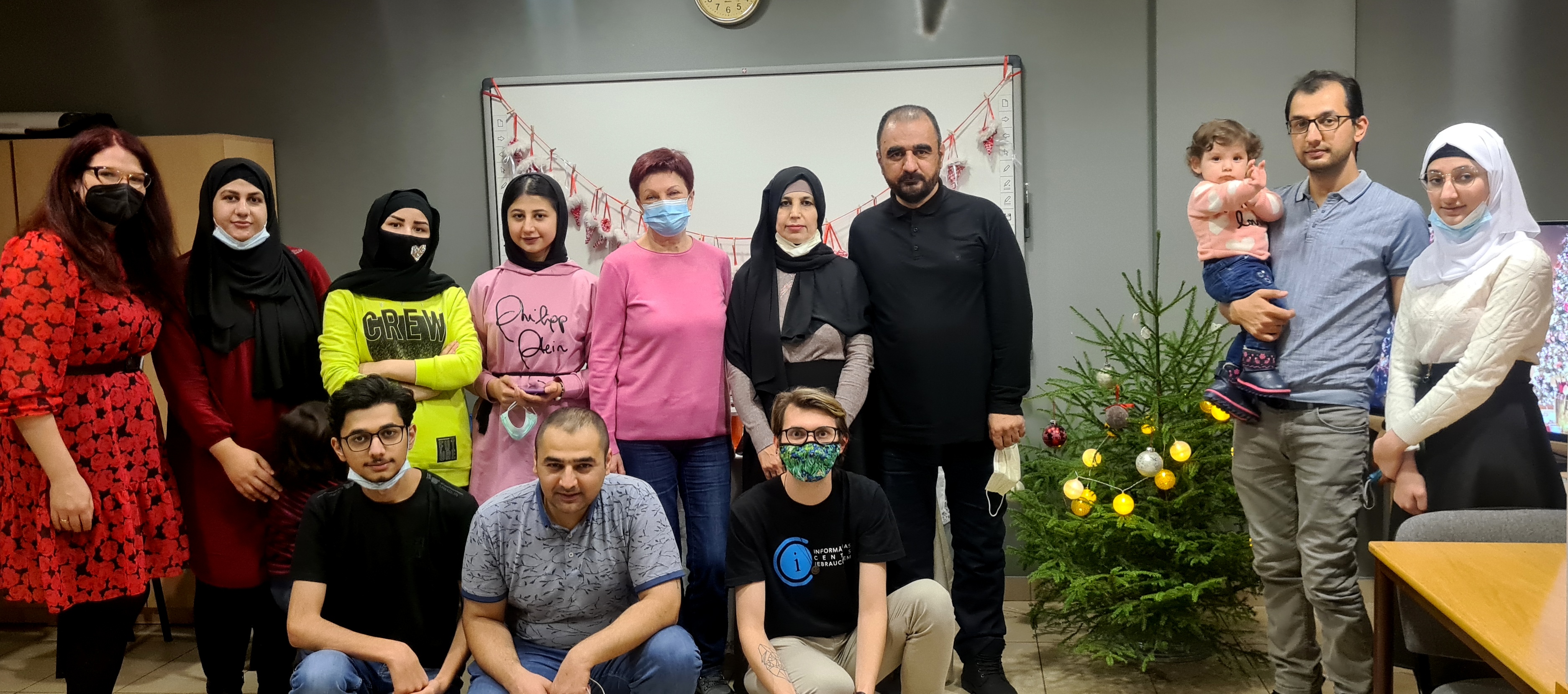
Support Actions for Persons Under International Protection III project is implemented with the support of the Asylum, Migration and Integration Fund and is co-financed by the European Union. Grant agreement No. PMIF/9/2020/3/02/
Persons under international protection are introduced to Christmas!
Ievietots: 27.12.2021

The year 2021 is gradually coming to an end. The little ones are waiting for Christmas surprises with excitement in their hearts, and the big ones are enjoying a cosy gathering together to remember heartily family moments with light in their hearts, and to wish each other harmony and love.
But there are many foreigners who have come to Latvia to ask for international protection, and for whom this will be the first Christmas, the first gingerbread and the first time, when they see a decorated Christmas tree. Therefore, in the evening of December 15, persons under international protection from Belarus and Afghanistan, as well as representatives of the local community met in the premises of the Society “Shelter “Safe House”” to experience themselves one of the most important Latvian holidays – Christmas and its traditions.
During the event, those who were present learned Christmas traditions, the main symbols of the holiday, and the traditional festive table. Together with the volunteer assistants, everyone had the opportunity to cook their own special gingerbread, which, after baking, was beautifully decorated with coloured icing, and to taste it for the first time. The persons present acknowledge that it was the first time they saw a decorated tree with ornaments and lamps, since Christmas was not celebrated in Afghanistan, but they were happy about this leisurely evening, enjoying delicious snacks, Christmas songs, the scent of gingerbread and joint creative activities. “Now we will call Latvia our home, so it is very important to learn and understand culture and traditions”.

Support Actions for Persons Under International Protection III project is implemented with the support of the Asylum, Migration and Integration Fund and is co-financed by the European Union. Grant agreement No. PMIF/9/2020/3/02/
Persons under international protection are learning the Latvian language
Ievietots: 17.11.2021

Currently, there are two groups of people who are learning the Latvian language under guidance of two teachers within the project “Support Measures for Persons under International Protection”.
These people learn the Latvian language remotely on a regular basis: 2-3 times a week. Byelorussians who are learning the Latvian language should be especially praised. Their level of Latvian is very high, and they are really enthusiastic about speaking Latvian.
On November 1st, another group began learning the Latvian language, this particular group consists of thirteen participants: three Iranian nationals, as well as ten Afghan nationals. In this group, the participants learn the Latvian language very intensively - up to five lessons a week. It is planned that the training will last until the end of December, if possible, it will continue face-to-face in December.
Along with the acquisition of the Latvian language, integration courses continue. There were three groups in October. So far, in November, one group has completed the course, and on 15 November the next group will start the integration course.
Vika Trenas, Buelorussian editor and writer: "Our group enjoyed learning together with our wonderful Lolita so much that we dream of continuing learning Latvian. Lolita is a real professional! Due to the large amount of information, the methodology seemed a bit extreme at first, but it certainly works. We are very grateful for the opportunities given to us and we will be looking for the next course already at A2 level.
Online courses were very convenient for me as a resident of Tukums. The atmosphere in the group was very friendly, the teacher really inspired us with her kind attitude, and we were very motivated! The fact that we are adults and it is important for us to adapt to our new community, probably, was and is a significant part of our motivation. Considering the epidemiological situation and the fact that students live in different cities (Riga, Jūrmala, Tukums), online courses are a real rescue for us. Thanks!"
Support Actions for Persons Under International Protection III project is implemented with the support of the Asylum, Migration and Integration Fund and is co-financed by the European Union. Grant agreement No. PMIF/9/2020/3/02/
Persons of international protection get to know the Latvian view of the world
Ievietots: 11.10.2021

As a part of the "Support Measures for Persons Under International Protection III" project, on 29 September persons from Iran, Congo and Afghanistan gathered in the premises of the Information Centre for Immigrants. The attendees were introduced to the Latvian way of life, traditions, as well as celebrations and view of the world.
Winter solstice, summer solstice, autumn and spring equinox were identified under the guidance of "Support Measures for Persons Under International Protection" lecturer Ramona Liepina. Then the immigrants were also told about the winter and winter joys so important in Latvia, as well as Meteni – a holiday with which traditionally begins the year of Latvians, as well as – on a larger scale – of ancient Indo-European peoples. It was explained to the attendees that Meteni is celebrated by playing music and dancing. One of the main treats of Meteni is pies. There were also stories about mummery, maskers and the meaning of masks used in these customs. In the continuation of the evening, the immigrants were introduced to various modern holidays that are celebrated in Latvia. For example, with 8 March or Women’s Day, as well as with 21 March or spring equinox. It seemed interesting to all participants that Latvians tend to celebrate their holidays both in accordance with pre-Christian traditions and in accordance with the church interpretation.
The Easter tradition was discussed: painting eggs with onion skins, playing with eggs, rolling eggs, eating eggs with salt to avoid lying. Swing for avoiding biting of mosquitoes. And also the characteristics of the Easter Bunny: how the Bunny brings sweets and chocolate eggs to children.
The conversation then turned to the arrival of spring, along with the upcoming joint works, arranging the surroundings and celebrating the Labour Day. Information on 4 May, Latvian Independence Day, as well as 8 May – the remembrance of the end of the Second World War, followed. Then Ramona introduced the International Protection Persons to the summer solstice, which is so important for Latvians – the very middle of the ancient year, as well as the fact that Latvians’ favourite holidays are Ligo Eve and Jani. Latvian personal names related to the midsummer celebrations did not pass unnoticed, namely the ancient girls’ name – Liga, and the boys’ name Janis. Ramona explained that Latvians try to celebrate Ligo and Jani in nature. Fireplaces, dances and, of course, weaving wreaths – with flowers for girls and with oak leaves for boys – are an integral part of the holiday. A number of pagan activities are practiced with wreaths – they are thrown onto the branches of trees, thus predicting which girl or boy will soon marry. Traditional dish is round cheese with caraway seeds.
At the end of the lecture on Latvian view of the world, was discussed the autumn equinox or Mikelis Day, when the harvest must be garnered, and the time of ghosts, zemlikas or faithful begins. In connection with this mysterious time, Ramona introduced the attendees to the Latvians’ love of grave culture: burning candles and commemorating the dead. The end of the time of ghosts comes on 10 November – Martins Day, and it is soon followed by 11 November – Lacplesis Day important for Latvians, as well as 18 November – Proclamation of the State of Latvia.
After the lecture on Latvian view of the world and the most important historical stops, the evening continued with creative workshops, where everyone participating could creatively express their talents!

Support Actions for Persons Under International Protection III project is implemented with the support of the Asylum, Migration and Integration Fund and is co-financed by the European Union. Grant agreement No. PMIF/9/2020/3/02/
Persons Under International Protection get acquainted with latvian cinema
Ievietots: 08.09.2021
In order to learn about the cinematography of the Latvian cultural canon, on the august 29th persons under international protection from Belarus, Eritrea, Syria, Iraq, Iran, and India in cooperation with Latvian volunteers got acquainted with the building and history of our historic cinema Splendid Palace in Riga. Afterwards, on the way to Preiļi, an interesting and creative cinema quiz was played on the bus. In Preiļi, everyone visited the Museum of Dolls and the exhibition of author’s dolls depicting various movie characters. The day ended with an exciting process - the transformation into old and historical movie characters, which are also characteristic of the history of Latvian cinema.

Support Actions for Persons Under International Protection III project is implemented with the support of the Asylum, Migration and Integration Fund and is co-financed by the European Union. Grant agreement No. PMIF/9/2020/3/02
Persons Under International Protection Continue To Get To Know the Latvian Cultural Canon
Ievietots: 03.09.2021

On August 29, persons under international protection together with volunteers went on a longer trip to Latgale to get acquainted with folk traditions other than those included in our Latvian cultural canon. In Aglona, the hosts of the Bread Museum welcomed everyone, introducing them to the Latvian bread baking traditions in the Latgalian style.
After exploring the museum, Latvians, Iranians, Syrians, Indians, Eritreans, Iraqis, Belarusians sat at the family table, enjoying a three-course meal of Latgalian home-cooked food, concluding the lunch with a tasting of kļockas (cottage cheese patties). In Aglona, visitors also had the opportunity to get to know the Basilica of Aglona, Svētavots spring, and the King’s Hill of Christ created by Christian volunteers. Rodion from Belarus spoke about his experience in applying for asylum and starting life in Latvia.
After that, Rodion answered questions about the integration process.




Support Actions for Persons Under International Protection III project is implemented with the support of the Asylum, Migration and Integration Fund and is co-financed by the European Union. Grant agreement No. PMIF/9/2020/3/02
Persons Under International Protection Get To Know the Latvian Cultural Canon
Ievietots: 05.08.2021

On July 31, participants of the Support Measures for Persons Under International Protection III project continued to get acquainted with the Latvian cultural canon.
On Saturday, participants visited Ziemeļblāzma culture palace where they had the opportunity to climb the observation tower and see Riga from a different point of view.
Later, we went to the park’s tea house to hear Iranian man Bashir tell about his experience and life in Latvia, and to ask him questions. After that, Dita Butule, educator at the Krišjānis Barons Memorial Museum, introduced the Latvian cultural canon – Latvian folk songs, the Dainas! Afterwards, we went together to the Mangaļsala pier, which was the first time most of the participants had seen it. The weather was kind to us and everyone enjoyed Latvia’s beautiful nature where our Daugava River enters the Baltic Sea. The event ended at the seaside, where the youth team of the European Solidarity Corps Solidarity Project “Oriented On Orientalism” talked about their project, offering to participate in a Latvian conversation café, an emotional support group, and a celebration of festivities of different cultures. The young people had prepared an activity for the participants about Latvian folk songs, asking them to arrange the lines of folk songs in the correct order, giving them the opportunity to get to know the content of the songs not only in Latvian, but also translated in English.
Participants received sweet gifts for completing the task: sweets and chocolates made in Latvia.
People from Syria, Iran, China, Belarus, Russia, Latvia, Palestine, and Cameroon took part in the event.



Support Actions for Persons Under International Protection III project is implemented with the support of the Asylum, Migration and Integration Fund and is co-financed by the European Union. Grant agreement No. PMIF/9/2020/3/02
On June 16th, persons under international protection listened to kokle playing and melodious summer solstice songs
Ievietots: 21.06.2021
People from Latvia, Palestine, Turkey, Congo, Iran, Russia, and Belarus came together for this event. Rozīte Katrīna Spīča, a member of the folklore group “Rīgas danči”, creatively presented the traditions and history of the Latvian solstice, as well as the mythological meaning of the kokle, inviting those present to unite in singing Midsummer (Līgo) songs. Everyone did quite well. The audience was eager to learn about the rich Latvian cultural heritage and solstice traditions. Participants sang in Latvian and feasted on the prepared treats, Midsummer cheese and summer vegetables, to give them energy for playing summer games.
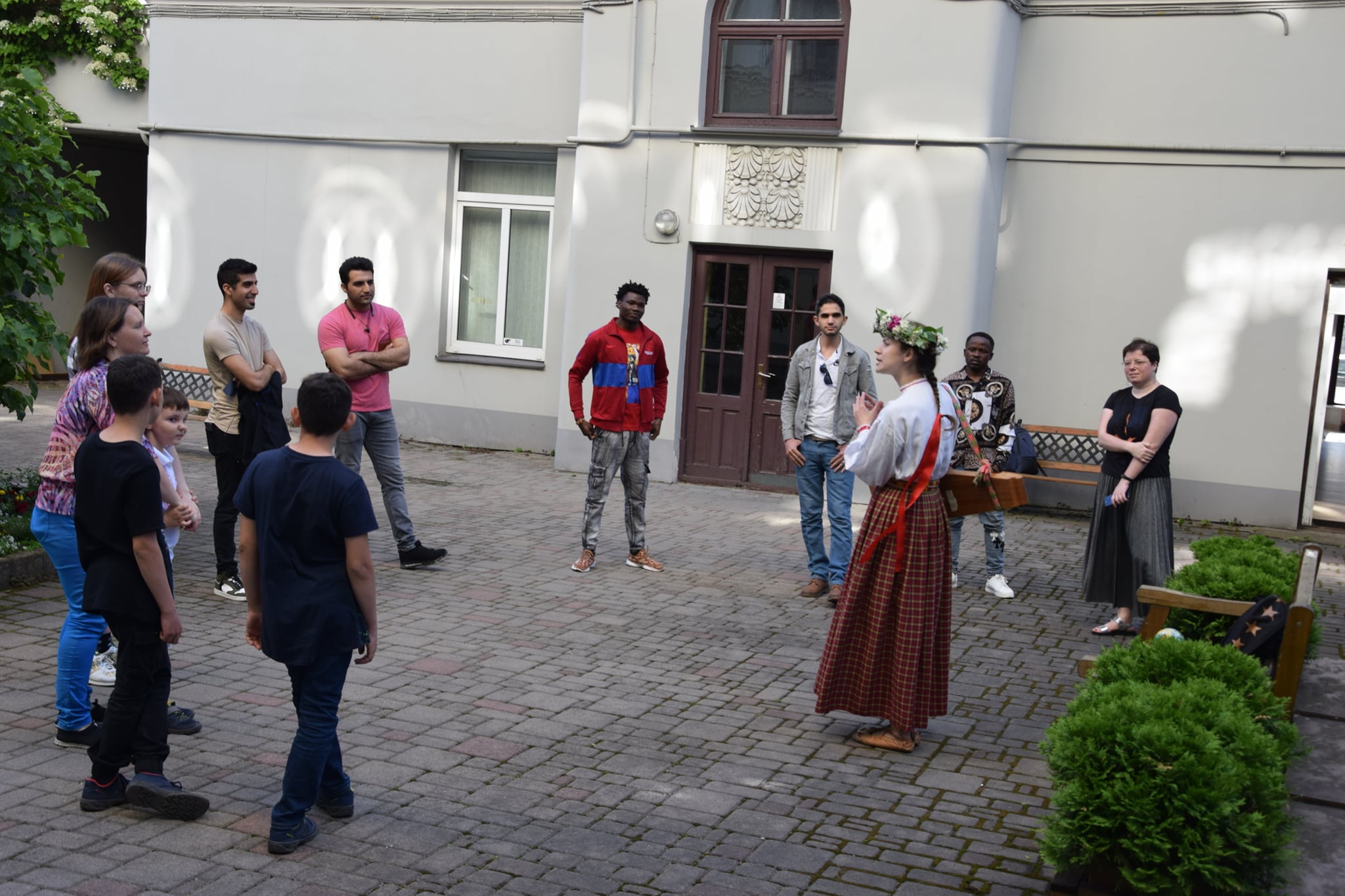
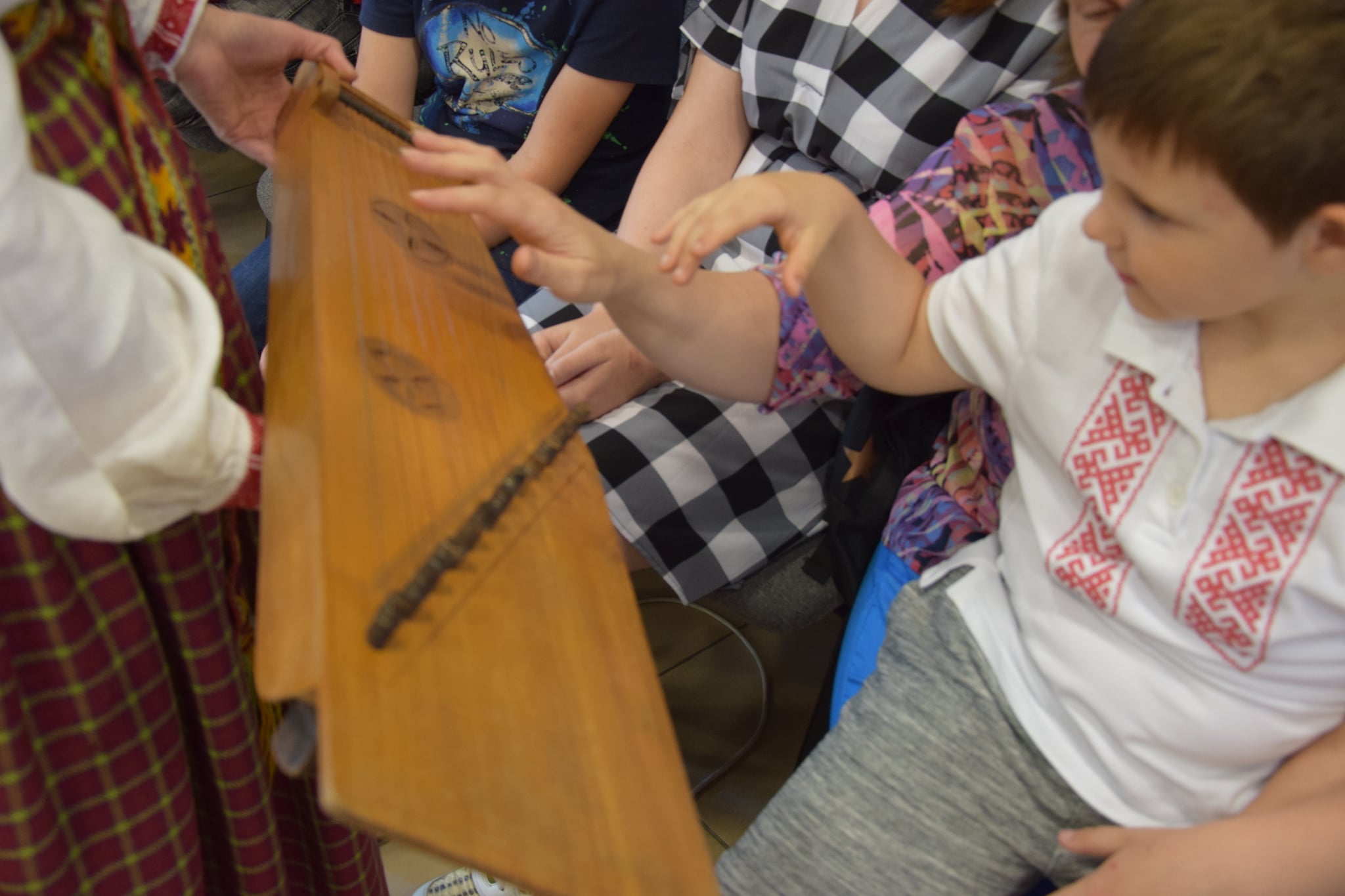
Support Actions for Persons Under International Protection III project is implemented with the support of the Asylum, Migration and Integration Fund and is co-financed by the European Union. Grant agreement No. PMIF/9/2020/3/02
A remote lecture for Persons under International Protection is being held
Ievietots: 20.05.2021
Today, within the framework of the project “The Support Actions for Persons under International Protection III”, a remote lecture on residence permits is given by Alvis Šķenders, a lawyer of the association “Shelter “Safe House””.

Support Actions for Persons Under International Protection III project is implemented with the support of the Asylum, Migration and Integration Fund and is co-financed by the European Union. Grant agreement No. PMIF/9/2020/3/02
On May 4th, persons under international protection celebrated the Day of the Restoration of Independence of the Republic of Latvia
Ievietots: 07.05.2021

Persons under international protection, who are currently residing in Latvia, celebrated May 4, the Day of the Restoration of Independence of the Republic of Latvia, in a small group.
People from Belarus, Turkey, and Afghanistan went to the Freedom Monument and were agreeably surprised by the flower carpet, because not in all cultures do flowers play such an important role - to show respect and love for freedom - as in Latvia.
Together with volunteers, Latvians, Iranians, and Indians had the opportunity to sit down to white-clad tables to get acquainted with traditional Latvian celebration dishes. While getting to know the tradition of the White Tablecloth Celebration, all the guests also wore flag ribbons, made lanterns, and learned to sing Latvian folk songs.

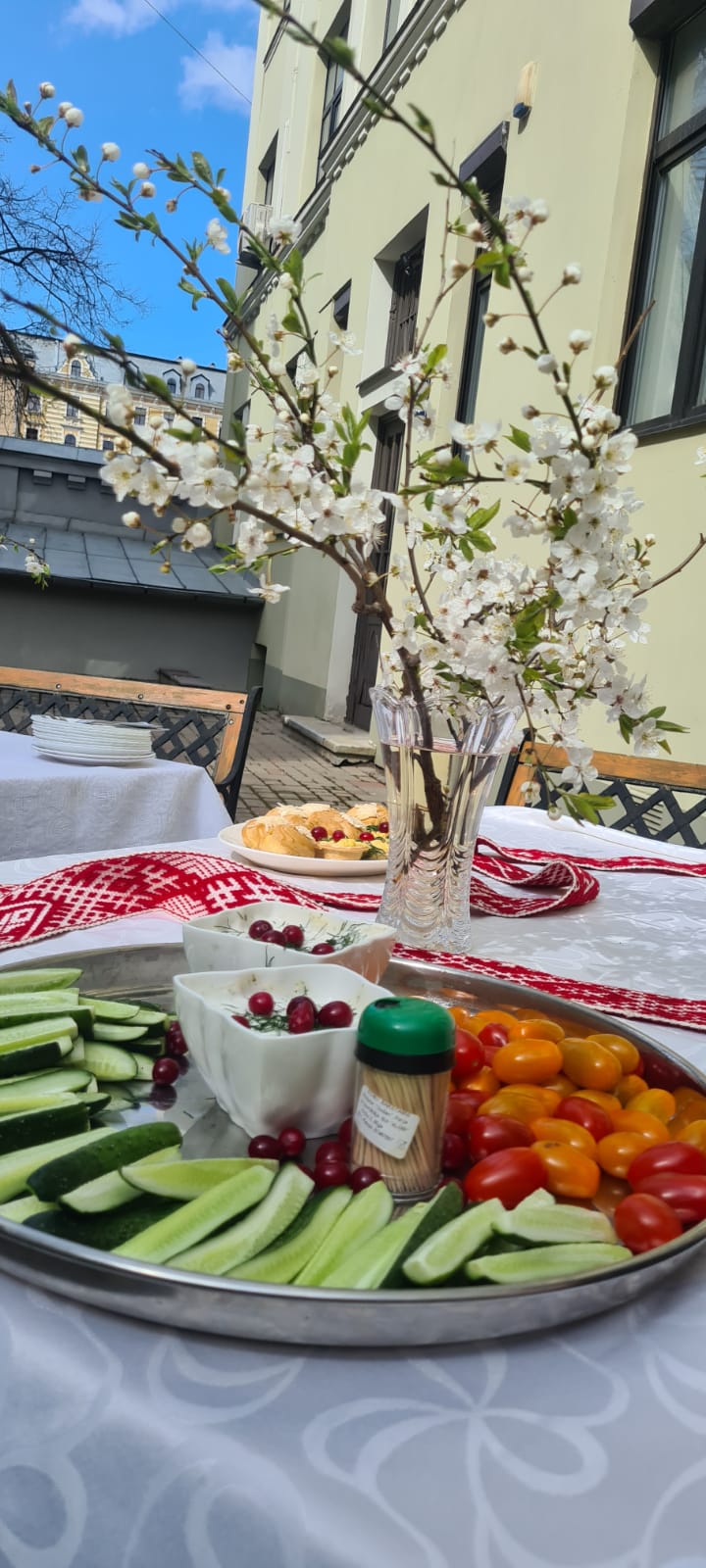

Support Actions for Persons Under International Protection III project is implemented with the support of the Asylum, Migration and Integration Fund and is co-financed by the European Union. Grant agreement No. PMIF/9/2020/3/02
On 31.03 the 3rd group successfully completed the Latvian language course within the project “Support Actions for Persons Under International Protection III”
Ievietots: 16.04.2021

This group received the Latvian language course also remotely. It should be noted that it is quite challenging for a teacher and for the respective target group to organise classes in the Internet environment: it is certainly more complicated to learn a new language remotely than in a classroom.
It should be pointed out that this time remote Latvian language course helped 14 persons to learn the language. All the 14 persons received certificates of completion of the Latvian language course; they included 4 persons, who asked for international protection, but live outside CAS “Mucenieki”.
The group included target group representatives from Belarus and one customer from Tajikistan.
Looking into the future – this group is not going to stop learning Latvian and is searching for new opportunities to continue learning the language until a decision awarding international protection is received, because they are aware that they will need it, if they live in Latvia.
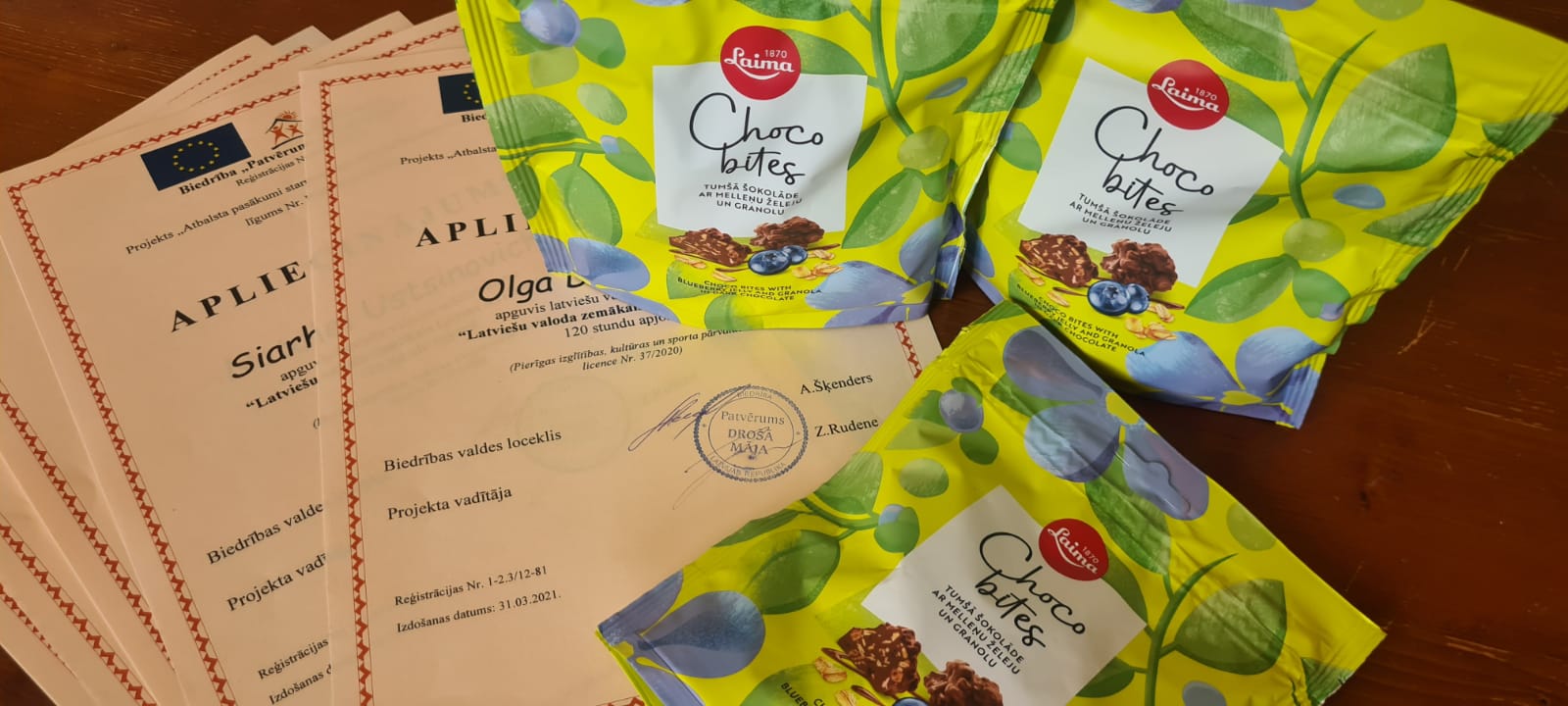
.jpeg)
The project “Support Actions for Persons Under International Protection III” is implemented with support of the Asylum, Migration and Integration Fund and is co-financed by the European Union. Grant Agreement No. PMIF/9/2020/3/02
Interview with a belarussian family about the integration in Latvia
Ievietots: 29.03.2021

Today we are publishing a brief interview with Larisa and Vadzim, two Belarusians, who requested political asylum in Latvia several years ago.
- When did you first arrive to Latvia?
Larisa and Vadzim: We had been visiting Latvia frequently even before the sad events in Belarus occurred, and knew the people and traditions well.
- Was it difficult to learn Latvian and integrate into Latvian environment?
Larisa: We were lucky in terms of Latvian language courses and teacher Lolita. Her temperament is very close to ours. I deeply respect all Latvians, who were able to preserve their culture and language, be proud of it and inspire other people with it, despite multiple difficulties in the history of this country.
- Do you think that Latvia and Belarus differ strongly?
Larisa: Historically, the way of Belarus is slightly similar, but unfortunately only 11.7% of Belarusian schools currently provide education in the official language and a person can get to prison for speaking Belarusian. I would like to see an institution that is similar to the Latvian Language Agency in Belarus, to ensure that all citizens respect the language as a national heritage and speak in it. To pass exams in this language, to evaluate the level of their education. Like it is in your country. I am ready to learn Latvian for the sole reason of solidarity with Latvians and in order to show respect to Latvians.
- How would you comment the current situation in Belarus?
Vadzim: Every day is like emotional seesaw for us. We wake up with hope every morning and go to bed in depression. Unfortunately, it can be claimed that low intensity civil war is under way in Belarus.
- Thank you for your straightforwardness and for this conversation.
The project “Support Actions for Persons Under International Protection III” is implemented with support of the Asylum, Migration and Integration Fund and is co-financed by the European Union. Grant Agreement No. PMIF/9/2020/3/02
Topics learned by asylum seekers, refugees and persons under subsidiary protection within the project “Support Actions for Persons Under International Protection III”
Ievietots: 04.03.2021

Within the project “Support Activities for Persons Under International Protection III” specialists of Society “Shelter “Safe House”” read lectures on important topics related to integration in Latvia to asylum seekers, refugees and persons under subsidiary protection.
For example, topics of lectures of the customer consultant, lawyer and lecturer of the society Gita Miruškina are as follows:
- Freedom of religion
- Employment
- Education
- Healthcare
- Accessibility of health services
- Healthcare
- Social security system
- Social assistance
- Respect for the rights of the child
- Gender equality
- Banking services
Informative lectures are an effective way for asylum seekers and persons under international protection persons to prepare for life in Latvia.
The project “Support Actions for Persons Under International Protection III” is implemented with support of the Asylum, Migration and Integration Fund and is co-financed by the European Union. Grant Agreement No. PMIF/9/2020/3/02
About the target group of project “Support Actions for Persons Under International Protection”
Ievietots: 16.02.2021

For the sixth year in a row, Society “Shelter “Safe House”” is implementing project “Support Activities for Persons Under International Protection”, demonstrating a professional, solution- and inclusion-oriented approach in this field.
Who is considered to be a person under international protection according to the law?
Beneficiary of international protection is a person to whom the refugee or alternative status has been granted.
* Refugee status is granted if the person is under threat in their country of origin due to persecution on the grounds of their beliefs, religion, race, nationality, social affiliation or political opinions.
* Alternative status is granted when the person is under threat in their home country due to war, death penalty, torture, ill-treatment.
* Refugee status is granted for an indefinite period, while alternative status – for a year.
Project “Support Actions for Persons Under International Protection III” is implemented with the support of the Asylum, Migration and Integration Fund and co-financed by the European Union. Grant Agreement No.PMIF/9/2020/3/02
On 14.01.2021 a training course of Latvian is started for the third group of persons under international protection
Ievietots: 14.01.2021

It is planned that the duration of the training of Latvian will be 3-5 months, while the frequency of classes will be: 2-3 classes per week. Overall, it is planned that 18 groups of persons under international protection will attend the training course of Latvian within the project. Children of the persons under international protection will be looked after during the training courses of Latvian, if necessary.
The children will be involved in plays, games and other creative activities, when learning Latvian. The coordinator will provide general information about the training of Latvian, as well as will provide answers to the questions asked by the learners during the project. The classes of Latvian will be organised in a special classroom in the Centre for Accommodation of Asylum Seekers Mucenieki, which is functionally accessible for everyone, including people with motion disorders.
The training will be led by teaching staff: teachers of Latvian experience in teaching language to immigrants. At the end of the studies, knowledge of customers will be checked and the results will be analysed.
The purpose of the course of Latvian language is to get language knowledge and skills necessary for work and everyday life, to develop main language skills: reading, speaking, writing, listening and use of grammar.
The course participants will be provided with free training materials, handouts and learning aids to promote the development of all Latvian language skills (listening, speaking, reading, writing) in the target group of the project.
Within the scope of the course it is planned that the course will be attended by 180 persons under international protection – in groups consisting of 5 – 15 people.
The project “Support Actions for Persons Under International Protection III” is implemented with support of the Asylum, Migration and Integration Fund and is co-financed by the European Union. Grant Agreement No.
PMIF/9/2020/3/02
Today, a remote lecture on residence permits for persons under international protection was held
Ievietots: 06.01.2021

Also in the new year, the association "Shelter" Safe House "" continues to implement the project "" The Support Actions for Persons Under International Protection". Today, a remote lecture on the nuances of residence permits was held.
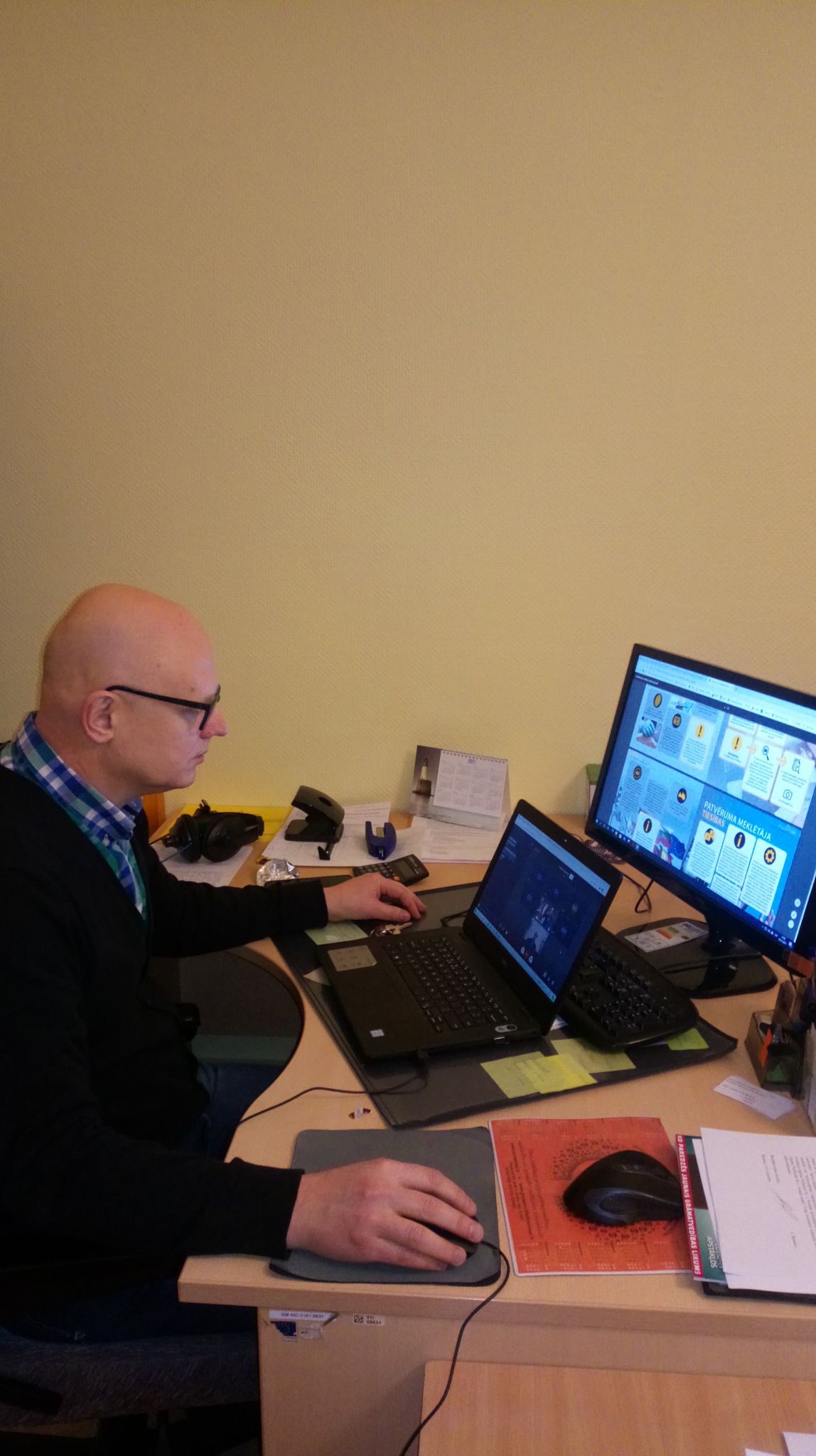
The project "Support actions for persons under international protection III" is implemented with the support of the Asylum, Migration and Integration Fund and is co-financed by the European Union. Grant agreement No. PMIF/9/2020/3/02
It is planned that during the period from 01.09.2020 to 31.12.2022 180 persons will take the 120 hour Latvian language course
Ievietots: 29.12.2020

"The Latvian language is very different from the Russian language. Only a small percentage of words are slightly similar, so learning the language is quite difficult. It takes time and a thorough repetition. All in all, it is not uncommon to learn a language that seems completely new to me, a Belarusian. I have been learning English since I was 6 years old. I am 26 now, but I still have not achieved a high level of language proficiency.
Currently, I am happy that I am offered the opportunity to learn Latvian together with the cool teacher Dita. She knows how to motivate us even in those days when we can`t even focus on learning because of our various challenges due to living in a new country."
/ Rodion Begliak - Belarus /
• It is planned that during the period from 01.09.2020 to 31.12.2022 180 persons will take the 120 hour Latvian language course
• The Latvian language course is currently being taught in 2 groups: clients from Belarus, Russia, Bangladesh, Azerbaijan and Ukraine.
• Given the epidemiological situation in the country, the studies are currently provided remotely.
.jpeg)
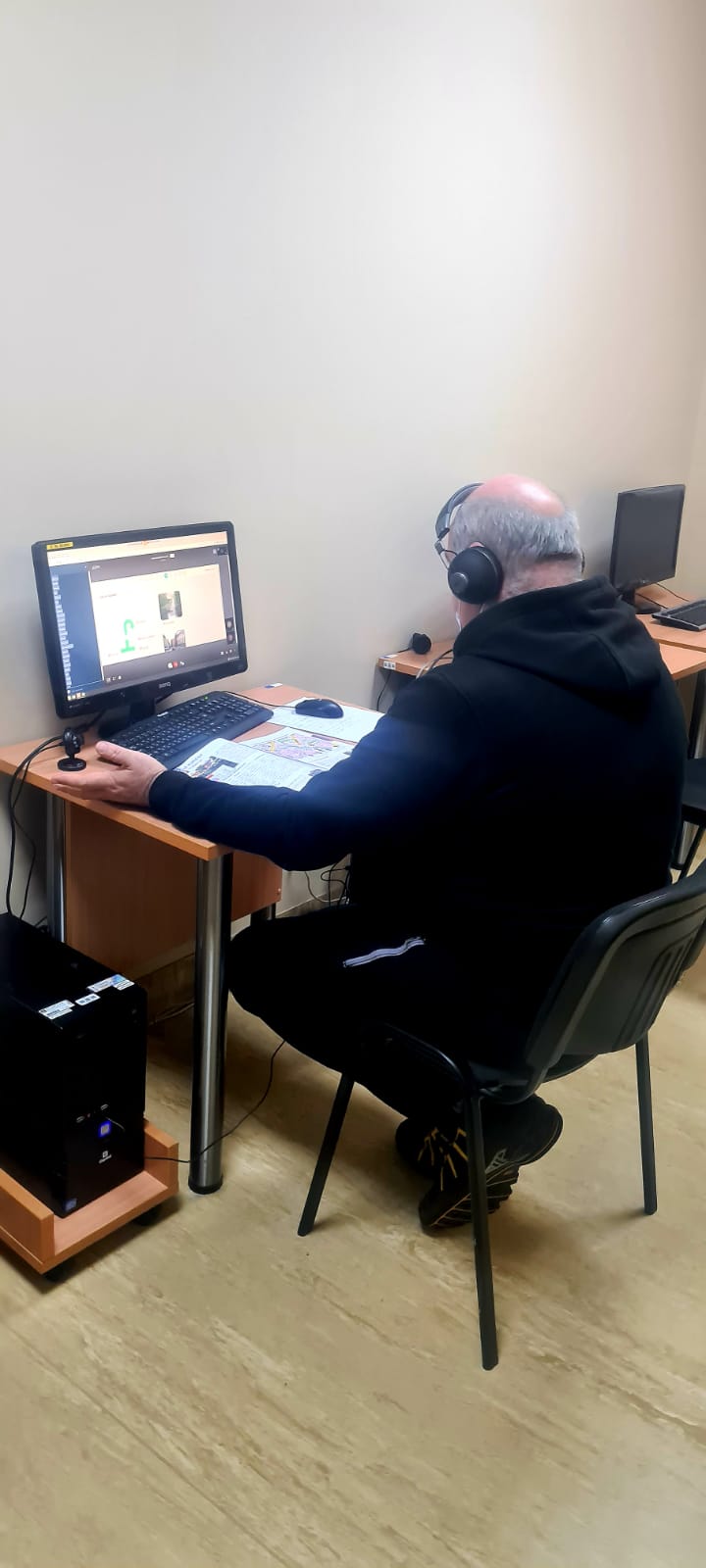
The project "Support actions for persons under international protection III" is implemented with the support of the Asylum, Migration and Integration Fund and is co-financed by the European Union. Grant agreement No. PMIF/9/2020/3/02

.jpeg)
.jpeg)


.jpeg)




















.jpg)



















.jpeg)

.jpeg)
